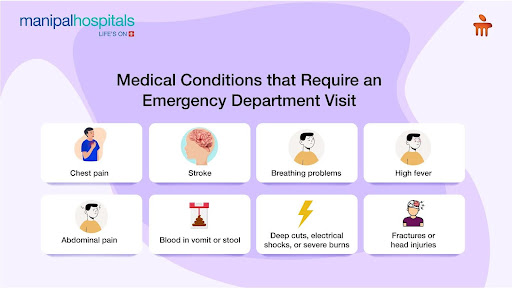When an unexpected illness or injury strikes, you know that immediate medical care is needed. But you may wonder whether you should visit an emergency department or not. While the answer to whether or not you should rush to an emergency hospital or clinic is not always clear, having information on when to visit can prevent complications and save lives, time, and money. In this blog post, we will briefly explain the conditions that warrant an emergency centre visit.
Medical Conditions That Require An Emergency Department Visit

Emergency medical care within hospitals is where you get treatment for severe illnesses or injuries. The department plays a vital role in assessing, treating, and stabilising patients needing immediate treatment. Manipal Hospitals houses a 24-hour emergency department, open 24 hours a day, seven days a week. For any injury or illness that is life-threatening or could cause permanent disability, you must visit the hospital.
Some of the emergency conditions treated are:
Chest pain
Severe chest pain or a sensation of squeezing accompanied by nausea, dizziness, or shortness of breath could be a sign of a heart attack. As a heart attack is a medical emergency, seeking medical help becomes even more crucial.
Stroke
This is a fatal medical emergency characterised by vision problems, dizziness, slurred speech, and a feeling of numbness in one or both arms. If you develop any of the above symptoms, time is of the essence; the longer you wait to seek care, the more you risk permanent disability or death.
Breathing problems
Chronic respiratory ailments such as asthma and COPD or conditions like pneumonia cause severe breathing problems warranting a trip to the emergency department.
High fever
Elevated body temperature accompanied by chills indicates the infection has spread to the bloodstream, requiring aggressive treatment. High fever in children accompanied by severe headache, lethargy, or unusual behaviour is of great concern and requires immediate medical intervention.
Abdominal pain
Localised abdominal pain accompanied by fever, severe vomiting, and diarrhoea is an indication of appendicitis and bowel obstruction. These gastrointestinal conditions are medical emergencies requiring immediate surgeries.
Blood in vomit or stool
It suggests a bleeding ulcer or bleeding from the small intestines. If the symptoms are associated with lightheadedness and a rapid heart rate, it may require a blood transfusion.
Deep cuts, electrical shocks, or severe burns
All these conditions require immediate medical intervention to minimise morbidity and mortality. The wound must be specially cared for and treated to avoid infections.
Fractures or head injuries
Head injuries or fractures in critical locations can be dangerous, especially when there is a loss of consciousness with injury. Therefore, the patients must be thoroughly examined and treated.
Eye injuries
Eye injuries can lead to vision loss if not treated properly. You must head to the Emergency department immediately if you experience pain or trouble seeing, cuts or tears in the eyelid, or foreign objects in the eye that cannot be removed easily.
Behavioural issues
If you experience thoughts of harming yourself and others or dealing with excessive stress, you can visit our 24-hour Emergency Hospital.
Other symptoms that require emergency care include:
-
If you have been involved in a major accident, you must visit the Emergency Hospital for immediate treatment
-
Severe bleeding that does not stop
-
Coughing or vomiting blood
-
Persistent vomiting or diarrhoea
-
Change in mental status (confusion)
-
Allergic reaction
-
Animal bites
-
Bleeding or trauma during pregnancy
-
Poisoning
-
Sudden inability to speak, walk, or move
If you think you are experiencing a medical emergency, seeking treatment at an emergency department is always better than waiting for symptoms to pass.
Conclusion
Emergency departments of hospitals are generally well-equipped to handle every health emergency, including vehicular accidents, falls, strokes, chest pain, and more. When you suspect a medical emergency, seeking immediate care is of utmost importance. Our Emergency Hospital in Bhubaneswar provides services around the clock, 24 hours a day, 7 days a week. Check out our blog page to receive the latest updates in the medical world.
FAQ's
The primary role of emergency physicians is to stabilise any injured or critical patient that comes in. They will administer initial emergency care, such as blood transfusion or providing oxygen therapy.
Triage is a process of identifying patients who need the greatest care and attention depending on their condition or illness. In the Emergency department, patients with less severe ailments will be asked to wait while those with immediate needs are attended first.
Some treatments and procedures administered in an emergency department of a hospital are lab work, radiological studies, ultrasound, CT scans, ECG for cardiac view, medication administration, and physician evaluation.
Whether or not hospitalisation is required will depend on the severity of your condition and the treatment you require. If you need ongoing care or observation, you may be admitted to the hospital.
You can bring relevant medical records, such as a list of medications you are taking, allergies, and past medical history. If you have insurance, bring relevant documents.


















9.png)
 4 Min Read
4 Min Read










